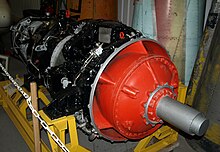Napier Eland
| Eland | |
|---|---|

| |
| Napier Eland on display at the Helicopter Museum (Weston). | |
| Type | Turboshaft/turboprop aero-engine |
| Manufacturer | Napier & Son |
| First run | 1953 |
| Major applications | Fairey Rotodyne Convair CV-540 |
The Napier Eland is a British turboshaft or turboprop gas-turbine engine built by Napier & Son in the early 1950s. Production of the Eland ceased in 1961 when the Napier company was taken over by Rolls-Royce.[1]
Design and development
[edit]The Eland was first tested in flight in 1953 in a Vickers Varsity aircraft.[2] Further flight proving was carried out from 1955 using the first production Airspeed Ambassador 2.[3] The Eland was dropped from production when Napier was acquired by Rolls-Royce Limited in 1961.[2]
The only production applications for the engine were two variants of the Convair CV-240 family, the Royal Canadian Air Force Canadair CC-109 Cosmopolitan and the civil Convair CV-540. The military and civil operators had perpetual trouble with the engines which were considered complex.[4] Due to their unreliability The Department of Transport reduced the time between overhauls.[5] The CC-106 had its Elands replaced with the Allison T56 turboprop and the CV540 was re-engined with the Pratt & Whitney R-2800 Double Wasp piston engine. Potential production applications which were subsequently cancelled were the Westland Westminster heavy-lift helicopter and the Fairey Rotodyne gyrodyne. The Rotodyne operated as an autogyro in forward flight using the Eland turboprops. For vertical flight the rotor was driven using an auxiliary compressor clutched to each Eland. They supplied compressed air to a combustion chamber at each rotor tip.[6]
Variants
[edit]- Eland N.El.1
- 2,690 hp (2,010 kW) + 825 lbf (3.67 kN) residual thrust, static at sea level ICAN conditions.[7]
- Eland N.El.3
- Powerplant for the Fairey Rotodyne driving the propeller and an auxiliary compressor to feed the rotor tip jets 2,805 hp (2,092 kW) + 500 lbf (2.22 kN) residual thrust, static at sea level ICAN conditions.[7]
- Eland N.El.4
- 3,765 hp (2,808 kW) + 610 lbf (2.71 kN) residual thrust, static at sea level ICAN conditions.[7]
- Eland N.El.6
- [8]
- Eland N.El.7
- The 504 adapted to helicopter / convertiplane, compressed air generator use.[8]
- Eland E.211
- The 504 adapted for mechanically driven helicopter rotors.[8]
- Eland 504
- (N.El.6)[8]
- Eland 508
- 504 with increased max continuous rating.[8]
Applications
[edit]
Turboshaft
[edit]Turboprop
[edit]- Airspeed Ambassador
- Canadair CC-109 Cosmopolitan (CL-66)
- Convair CV-540
- Fairey Rotodyne
- Vickers Varsity (one aircraft as an engine test bed in 1954)
Engines on display
[edit]A turboshaft Eland is on display at the Helicopter Museum, Weston-super-Mare.[9]
Specifications (Eland N.El.6)
[edit]
Data from Flight 29 August 1958 p.340[11]
General characteristics
- Type: Single-shaft turboprop
- Length: 120 in (3,000 mm)
- Diameter: 36 in (910 mm)
- Dry weight: 1,735 lb (787 kg)
Components
- Compressor: 10-stage axial flow
- Combustors: 6 chambers
- Turbine: 3-stage
- Fuel type: Jet fuel
Performance
- Maximum power output: 3,500 hp (2,600 kW) (eshp - equivalent shaft horse-power - adding power from residual thrust)
- Overall pressure ratio: 7:1
- Air mass flow: 31 lb/s (14 kg/s)
- Specific fuel consumption: 0.595 lb/h (eshp)
- Thrust-to-weight ratio: 2.0 eshp/lb (3.3 kW/kg)
See also
[edit]Comparable engines
Related lists
References
[edit]Notes
[edit]- ^ Gunston 1989, p.107.
- ^ a b "Napier Eland 504A", Atlantic Canada Aviation Museum, retrieved 26 May 2008
- ^ Jackson 1973, p. 26
- ^ "Power: The Pratt & Whitney Canada Story". CANAV Books. 1989.
- ^ Pickler, Ronald Arthur; Milberry, Larry (1995). Canadair : The first 50 years. Canav Books. ISBN 978-0-921022-07-7.
- ^ "A History of Fairey Engineering", WFEL.co.uk, archived from the original (doc) on 16 March 2007, retrieved 26 May 2008
- ^ a b c Taylor, John W.R. FRHistS. ARAeS (1955). Jane's All the World's Aircraft 1955-56. London: Sampson, Low, Marston & Co Ltd.
- ^ a b c d e Bridgman, Leonard, ed. (1959). Jane's all the World's Aircraft 1959–60. London: Sampson Low, Marston & Co. Ltd.
- ^ The Helicopter Museum - Fairey Rotodyne Archived 26 December 2007 at the Wayback Machine Retrieved: 28 July 2009
- ^ Napier Eland A New Turboprop For Fixed- And Rotary-Wing Applications,Flight magazine 23 July 1954,p.114
- ^ "British Aero Engines 1958". Flight: 340. 29 August 1958. Retrieved 18 December 2017.
Bibliography
[edit]- Gunston, Bill. World Encyclopedia of Aero Engines. Cambridge, England. Patrick Stephens Limited, 1989. ISBN 1-85260-163-9
- Jackson, A.J. (1973), British Civil Aircraft since 1919 - Volume I, Putnam & Company Ltd, ISBN 0-370-10006-9
External links
[edit]- Atlantic Canada Aviation Museum - Napier Eland 504 information sheet
- "Eland 1959" a 1959 Flight article
